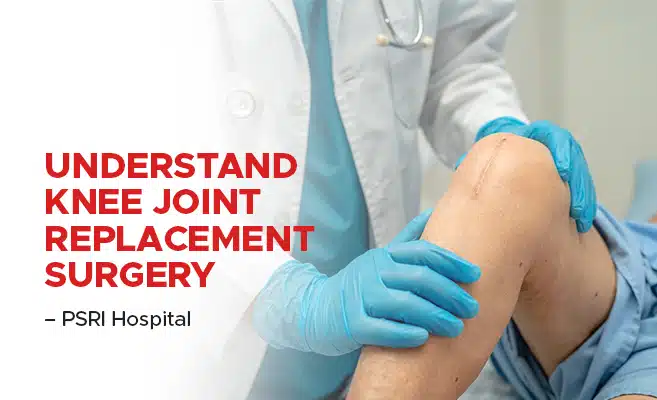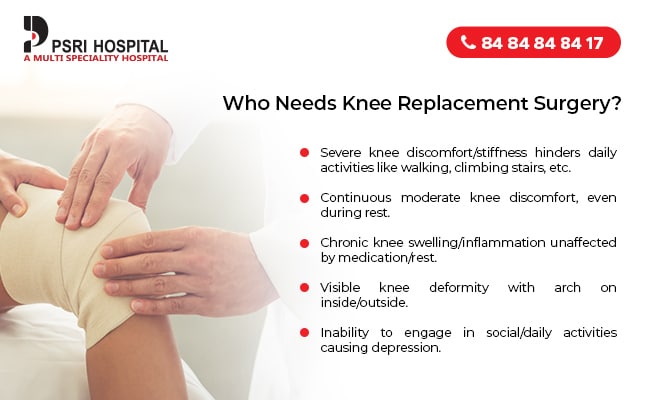Understand Knee Joint Replacement Surgery

Suffering from knee joint pain can be a debilitating experience, affecting every aspect of your life. When other knee-related treatments fail to cure your constant pain and discomfort, knee joint replacement surgery becomes an option.
However, the thought of undergoing a major surgical procedure can be overwhelming and raise many questions. Is it the right decision? How safe is it? What are the risks and benefits? If you find yourself struggling with these questions, you’re not alone.
In this blog, we’ll provide you with a comprehensive guide to understanding knee joint replacement surgery, so you can make an informed decision and regain your mobility and quality of life.
What is Knee Joint Replacement Surgery?
Knee replacement surgery is a procedure that involves the removal of certain portions of the knee joint bones, which are then replaced with artificial implants. This knee surgery is primarily performed to alleviate knee pain and stiffness that is often caused by osteoarthritis.
Typically, this procedure is recommended for individuals who have advanced knee arthritis, which causes the knee cartilage to wear away, resulting in an uneven, pitted, and eroded surface. Such a condition can lead to a change in body alignment, instability, stiffness, and severe pain. Additionally, knee joint replacement surgery can also be helpful for those who have a weakened knee joint due to an injury or other underlying condition.
Why have Knee Replacement Surgery?
Knee Replacement Surgery involves replacing an ailing or weak knee with a prosthesis. Joint replacement surgery in Delhi NCR is usually required in three conditions; Osteoarthritis, Rheumatoid arthritis, and post-traumatic arthritis.
Osteoarthritis: In this condition, the cushioning between the joints starts to wear off; this causes more friction against the bones of the joint when they move. This rubbing results in severe pain, stiffness, and inability to move around much or as quickly.
Osteoarthritis can be brought on by joint cartilage deterioration, inflammation, and ultimately loss. As the cartilage ages, the bones begin to rub against one another. To make up for this, the bones frequently thicken, but this causes extra friction, discomfort, and pain in the knee joint.
Rheumatoid arthritis: Also known as inflammatory arthritis, it causes the membrane surrounding the knee joint to thicken and swell. Chronic inflammation destroys cartilage, resulting in stiffness and pain, requiring knee surgery.
Post-traumatic arthritis: This specific form of arthritis results from a serious knee injury. The knee cartilage will be impacted if the ligaments or the bones around the knee break.
When to go for Knee Joint Replacement Surgery
While many of you must be suffering from pain in your knee joint and wondering whether to go for surgery or use other related treatments, knee joint replacement surgery generally opts when other less invasive treatments fail to cure and relieve the pain.
However, when a person starts suffering majorly from pain which starts interfering with daily activities like walking, climbing, etc., or when the knee becomes deformed and bows regularly, they should immediately consider knee replacement surgery. Pain in the knee joint is directly proportional to age and weight. Increasing age and weight gain results in the weakening of knee joints.
Get your surgery for knee replacement in Delhi at PSRI Hospital. We have an expert team of orthopedic surgeons in Delhi to give you the best treatment.
Who Might Need Knee Replacement Surgery?
Knee joint replacement surgery may be recommended in these cases:

Surgery may be the best choice if none of the previous treatments have succeeded. Getting in touch with the best orthopedic doctor in Delhi NCR will help you get the best treatment that suits your condition.
The Joint Replacement Surgery
Since knee arthroplasty requires major surgery, pre-operative planning, doctor visits, and physical examinations typically start a month before the scheduled surgery date.
Preparatory and diagnostic tests will include:
- Checking blood count.
- Seeing how the blood clots are.
- Carrying out electrocardiograms (ECGs) and urine tests.
Knee cap replacement surgery is mainly performed either under general, spinal, or epidural anesthetic.
During the surgery, a cut is made near or above the knee, removing the damaged cartilage and bone. A new knee joint is fixed using specialized cement and screws. This replaced metal component creates a surface for the joint. A medical plastic spacer is inserted between the joints for smoother rubbing of the joints. The incision is stitched and closed.
Post-Surgery Recovery
Depending on how well patients adhere to and respond to rehabilitation, a patient who has undergone knee replacement surgery will stay in the hospital for 1 to 3 days.
Although there will be discomfort, medical professionals will encourage patients to get up and try to walk the day after the treatment, usually with the use of some walking support. You must stick to the rehabilitation guidelines.
Post-surgery, physical therapy is advised for some time to make the joints smooth and remove stiffness. With time, the pain will reduce, and the patient will be able to move around freely without any restriction or pain. Knee replacement surgery has proven to be successful in reducing joint pain. The patients may be advised to follow some precautionary measures post-surgery for some time to avoid complications.
How Long Does the Effect of Knee Replacement Surgery Last?
Nowadays there are implants having a very good life In 85% to 90% of patients, knee replacement implants should last at least 20 years. The implants do not, however, last forever, but if you are opting for a good implant that will give you a quality life of more than 20-25 Years
General wear and tear over a 20- 25 year period can lead the implant to become loose. This could result in any of the following symptoms, depending on the patient:
- Pain
- Loose implant particles
- Knee instability
- Infection
An orthopedic surgeon in Delhi would suggest undergoing knee revision surgery to replace the initial implant when such symptoms appear. Immediate revision surgery is necessary for infections in particular. Though uncommon, infection following knee replacement surgery can be detrimental as the implant cannot protect itself against bacteria if they enter the body.
Conclusion
In conclusion, knee joint replacement surgery is a life-changing procedure that can help alleviate pain and restore mobility for those suffering from joint problems. At PSRI, our best orthopedic doctor in Delhi NCR understands knee replacement surgery’s importance and strives to provide the best care possible.
By understanding the procedure and taking necessary precautions before and after surgery, patients can experience a successful outcome. We hope this article has shed some light on knee replacement surgery and helped you feel more confident about pursuing joint replacement surgery.
Get the best joint replacement surgery in Delhi NCR with PSRI Hospital. We are committed to providing quality joint replacement surgery that gets you back on your feet and enjoying life to the fullest. Contact our team to know more about knee replacement surgery cost in Delhi and more.
FAQs
Q 1: Who is a candidate for knee joint replacement surgery?
Ans: Patients with severe knee pain and limited mobility, who have not found relief with non-surgical treatments, may be candidates for knee replacement surgery.
Q 2: How is knee joint replacement surgery performed?
Ans: During knee replacement surgery, the damaged portions of the knee joint are removed and replaced with artificial implants made of metal, ceramic, or plastic.
Q 3: What is the recovery process like after knee joint replacement surgery?
Ans: Recovery time varies, but most patients can resume normal activities within 15 -30 days. Physical therapy is an important part of the recovery process.
Q 4: What are knee joint replacement surgery’s potential risks and complications?
Ans: Risks of knee replacement surgery include infection, blood clots, nerve damage, and joint stiffness. Your surgeon will discuss potential risks and complications with you before the surgery.

 Book An Appointment
Book An Appointment Virtual Consultation
Virtual Consultation





